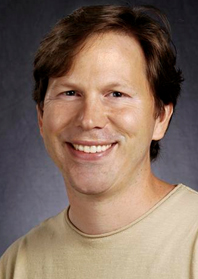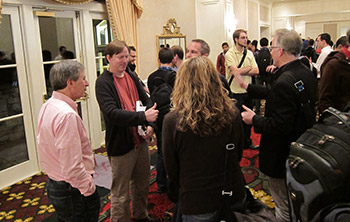UC San Diego Computer Scientist Stefan Savage Accepts 2013 SIGOPS Mark Weiser Award
By:
- Doug Ramsey
Published Date
By:
- Doug Ramsey
Share This:
Article Content

Stefan Savage
He is the first professor from the University of California, San Diego to win the prestigious SIGOPS Mark Weiser Award. On Nov. 5, computer science and engineering professor Stefan Savage received the 2013 award from the ACM Special Interest Group on Operating Systems (SIGOPS) during the Symposium on Operating Systems Principles (SOSP) in Farmington, PA.
“Professor Savage’s work crosses the boundaries from technology challenges to public policy implications of cybersecurity,” said Rajesh Gupta, chair of the Computer Science and Engineering (CSE) department at UC San Diego. “His work is a prime example of how computer science is catalyzing scientific advances and solving societal problems.”
The Weiser Award goes to individual researchers who are chosen based on contributions to computer systems research that are “highly creative, innovative, and possibly high-risk.” Savage also met the requirement that winners must have begun their careers no earlier than 20 years prior to nomination: he earned his Ph.D. from the University of Washington in 2001 – the same year that the Weiser Award was launched.
“Stefan Savage is, by far, the most creative person working in the hugely important fields of network security, privacy and reliability,” according to materials submitted as part of his nomination. “He has an uncanny ability to ask exactly the right question, propose exactly the right solution, and see that solution through to impact.”
The award was created in 2001 in honor of computing visionary Mark Weiser and his accomplishments during a long career at Xerox PARC.
That same year, Savage joined the CSE faculty in UC San Diego’s Jacobs School of Engineering, and according to the nominating materials, his reputation was not built on a single contribution. Instead, he is credited with “a collection of individually high-impact contributions that point in a single, critically important direction: analyzing Internet attacks and attackers as elements of an integrated technological, societal, and economic system, and recognizing that no one-dimensional intervention has a prayer of succeeding.”

Stefan Savage gives a thumbs-up after receiving the Weiser Award.
“Our inability to select a single ‘greatest hit’ does not make The Beatles a lesser band; rather, we recognize that any one of their better songs would have been sufficient to catapult a lesser band into the Rock & Roll Hall of Fame.”
Savage’s two Ph.D. advisors at the University of Washington are previous winners of the Weiser Award: Brian Bershad in 2004, and Tom Anderson in 2005. UC San Diego joins a distinguished roster of institutions with Weiser Award winners on their faculties: MIT, Stanford, University of Michigan, Germany’s Max Planck Institute for Software Systems, UC Berkeley, Microsoft Research, and Google, which took the award in 2012.
“This recognition of Stefan’s work underlines department's success in identifying compelling junior talent and cultivating them to reach heights in their research careers,” observed CSE’s Gupta. “Stefan is also an extraordinarily pleasant colleague to work with, one who is solidly at the core of the collegial culture of this department.”
In the CSE department, Savage is a member of the Systems and Networking as well as the Security and Cryptography research groups. His research interests lie at the intersection of distributed systems, networking and computer security, with a current focus on embedded security and the economics of cybercrime. Savage’s research has touched on a wide variety of cyber security issues, including worms, viruses, intrusion detection and denial-of-service attacks.
Currently Savage serves as director of UC San Diego’s Center for Networked Systems (CNS), and as co-director of the Cooperative Center for Internet Epidemiology and Defenses (CCIED), a partnership between UC San Diego and the International Computer Science Institute in Berkeley.
Share This:
You May Also Like
UC San Diego is Strengthening U.S. Semiconductor Innovation and Workforce Development
Technology & EngineeringStay in the Know
Keep up with all the latest from UC San Diego. Subscribe to the newsletter today.



